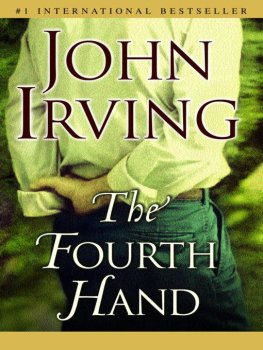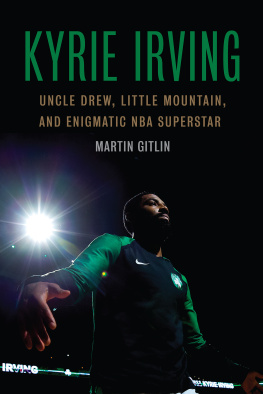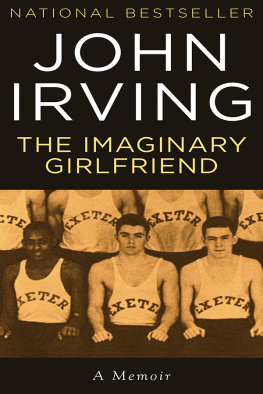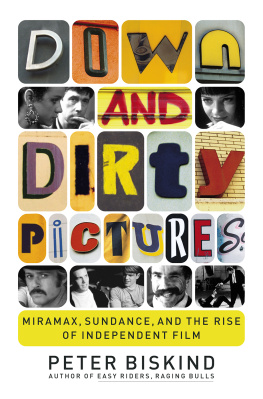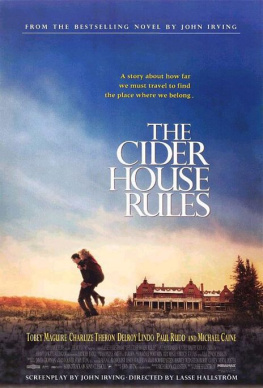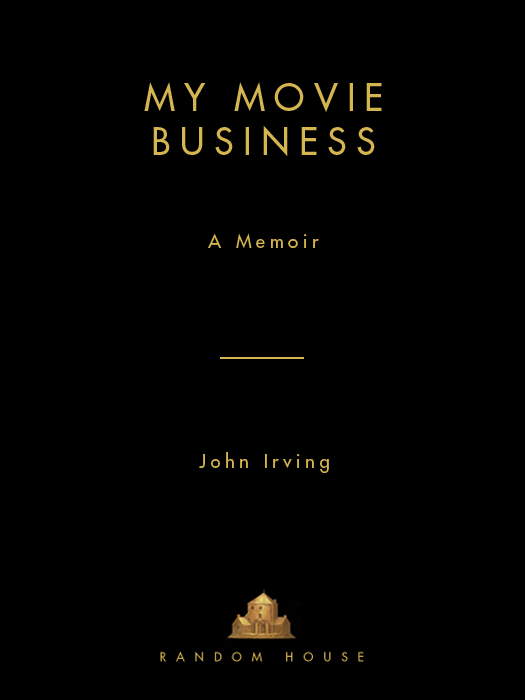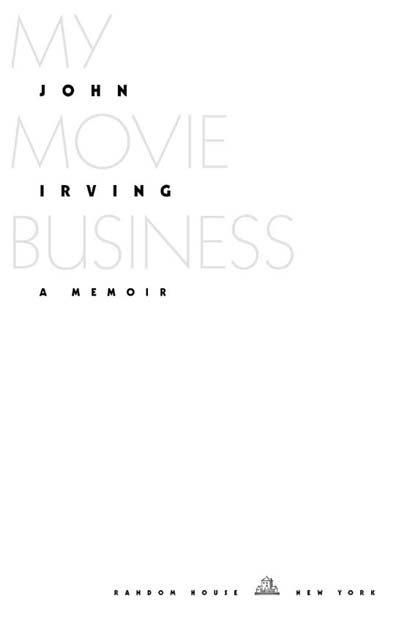ALSO BY JOHN IRVING
A Widow for One Year
Trying to Save Piggy Sneed
A Son of the Circus
A Prayer for Owen Meany
The Cider House Rules
The Hotel New Hampshire
The World According to Garp
The 158-Pound Marriage
The Water-Method Man
Setting Free the Bears
Copyright 1999 by Garp Enterprises, Ltd.
Excerpt from In One Person copyright 2012 by Garp Enterprises, Ltd. Reprinted by permission of Simon & Schuster, Inc.
All rights reserved under International and Pan-American Copyright Conventions. Published in the United States by Random House, Inc., New York.
Random House and colophon are registered trademarks of Random House, Inc.
Grateful acknowledgment is made to William Morrow and Company, Inc., for permission to reprint from The Cider House Rules, by John Irving, copyright 1985 by Garp Enterprises, Ltd. Reprinted by permission of William Morrow and Company, Inc.
This book contains an excerpt from In One Person by John Irving, published by Simon & Schuster, Inc. This excerpt has been set for this edition only and may not reflect the final content of the forthcoming edition.
Library of Congress Cataloging-in-Publication Data
Irving, John.
My movie business : a memoir / John Irving.
p. cm.
eISBN: 978-0-375-50448-8
1. Irving, John. Film and video adaptations. 2. Novelists, American20th century Biography. 3. ScreenwritersUnited States Biography. 4. Cider house rules (Motion picture) 5. Motion picture authorship. I. Title.
PS3559.R8Z468 1999 813.54dc21
[B] 99-15800
Random House website address: www.atrandom.com
v3.1_r1
For my son Colin,
who has borne the disappointments
of this business with me.
CONTENTS
| MRS. BERKELEYS CONSTIPATION
M y grandfather Dr. Frederick C. Irving graduated from Harvard Medical School in 1910. He was an intern at the Massachusetts General Hospital and later became chief of staff at the Boston Lying-Ina pioneer institution, founded in 1832. In my grandfathers day, the Boston Lying-In had already become one of the worlds leading obstetrical hospitals.
Dr. Irving was also a professor of obstetrics at Harvard, and the author of three books: The Expectant Mothers Handbook, A Textbook of Obstetrics, and a biography of the Boston Lying-In Hospital called Safe Deliverance. The last was chiefly a history of obstetrics and gynecological surgery in the United States; it was published in 1942, the year I was born. When I first told my parents that I wanted to become a writerI was fourteenmy parents said, Well, your grandfather is a writer. You should read his books.
And so, at about the same time I first read Charles Dickens, I began to read my grandfather Fritz Irving. For a fourteen-year-old, the clinical details of the early days of obstetrics and gynecological surgery were frankly more eye-opening than anything in Charles Dickens, although Dickens would ultimately prove to be a greater influence on my writing than Dr. Irving. Thank goodness.
My grandfather was an unusual physiciana man of science, but with Renaissance knowledge and positively Victorian prose. A short example of the latter should suffice.
A student of medicine begins his novitiate when he goes to medical school; but he should have entered upon his apprenticeship as a doctor many years before, when for the first time he was allowed free choice in his earlier education. At that point two roads are always open: one, straight and narrow, that leads through the sciences with only a few brief detours into general knowledge; the other, circuitous and serpentine, that wanders far afield, dips more deeply into the wider realms of learning, and returns to the highway only when necessity demandsthis is the more entrancing road, for there are more flowers beside it, and from the ancient hills that it surmounts one sees the world more clearly.
It was clear to me, from an early age, that I would be a traveler on exclusively the circuitous and serpentine roadthe one with more flowers beside it. Medical school was not for me. I wasnt a good enough student. Yet the only author I actually knew was a renowned obstetrician with a questionable sense of humor.
Well, maybe that isnt true. One summer in New Hampshire, on the beach at Little Boars Head, when I was still a young boy, someone pointed to a pale, ungainly man in a yellow bathing suit and said: Thats Ogden Nash, the writer. To this day I dont know if it was, but I shall carry the image of that funny-looking man, the writer, to my grave. I immediately took up reading Ogden Nashs humorous verse, although I never thought that Mr. Nashs sense of humor could hold a candle to my grandfathers.
In introducing one of his patients to the reader, Grandfather wrote: Mrs. Berkeley had contributed nothing to the world except her constipation. That would be a fine first sentence to a novel. Im sorry my grandfather didnt write novels, for his sense of humor was not limited to his medical writings. He was also the author of a scandalous poem called The Ballad of Chambers Street; it is a poem of such astonishing lewdness and vulgarity that I will not repeat more than two stanzas. There are seventeen stanzas in all, four of which are anti-Semitic; another four are deeply obscene. But just so you can appreciate the sound of the thing, here are two of the least offensive stanzas. (The poem concerns the unwanted pregnancy of a loose young woman named Rose who has a catastrophic abortion. The procedure is performed by an abortionist named Charlie Green. The real Dr. Green was a respected professor of obstetrics and gynecology at Harvard.)
High in a suite in Chambers Street,
ere yet her waters broke,
From pregnant Rose they took her clothes
and neer a word they spoke.
They laid her head across the bed,
her legs they had to bend em.
With sterile hands they made demands
to open her pudendum.
The introitus admits my fist
without the slightest urgin.
Therefore I ween, said Charlie Green,
that Rose is not a virgin.
And I would almost dare declare
that she has had coition,
which in the main would best explain
her present sad condition.
For years after my grandfathers death, my father would receive handwritten and typewritten copies of the infamous ballad; Dr. Irvings medical-school students had faithfully transcribed The Ballad of Chambers Street from memory. Medical students have excellent memories.
Grandfather was a man of extreme erudition and unaccountable, even inspired, bad taste; as such, he would have been a terrific novelist, for a good novel is at once sophisticated in its understanding of human behavior and utterly rebellious in its response to the conventions of good taste.
As Charlotte Bront wrote in 1847: Conventionality is not morality. Self-righteousness is not religion. To attack the first is not to assail the last. I used the Bront quotation as an epigraph to my sixth novel, The Cider House Rules, together with a far more prosaic observation made by a physician named H. J. Boldt in 1906. For practical purposes abortion may be defined as the interruption of gestation before viability of the child.
Grandfather probably agreed with Dr. Boldt. Notwithstanding the Hippocratic oath


